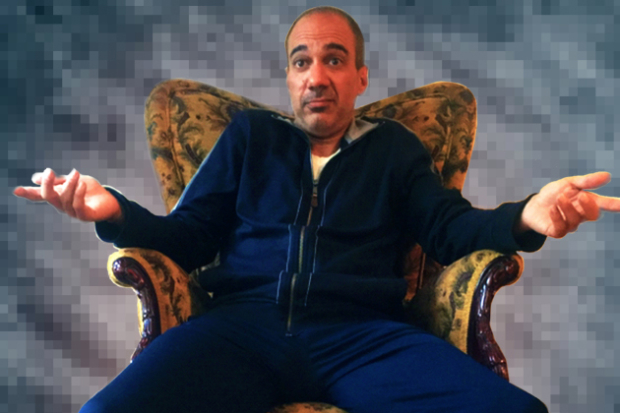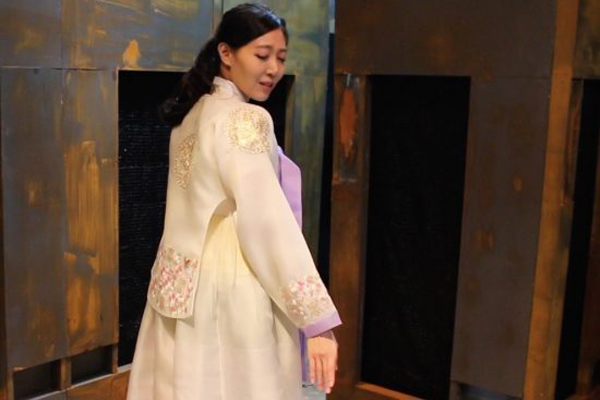FringeNYC 2016: Rent Control; Johnny Darlin: In the Closet; While Ophelia's Korean Drum Weeps

(© Joe Osheroff)
This solo show from Evan Zes may just be the surprise thriller of the festival. It's thrilling because it deals with the shady underbelly of New York City's most tawdry industry: real estate. It's surprising because, with his goofy-uncle-in-a-track-suit demeanor, Zes gives us no indication that he's about to take us on such a hair-raising journey.
The show starts like a thousand other self-indulgent solo shows: An actor sits onstage and tells us how he came to live in New York City. While stories of tiny apartments and crazy superintendents are perfunctory to the genre, Zes' situation is a little different: He lucked into a rent-stabilized two-bedroom apartment on the Upper East Side (rent: $900 a month) and lived there for 15 years.
Granted, he was never actually on the lease. By the time the story begins, the real leaseholder, Jen Wolf, is long gone to New Zealand. A succession of actors has occupied the space since then, sending Wolf the rent money that she then forwards to the landlord. Since he goes out of town so often for work, Zes decides to illegally sub-sublet the apartment. He charges ever-higher rents until he hits the Airbnb jackpot and starts pulling in six-figure profits from this illicit side business. Like a Mafioso in too deep, he prays to a portrait of Wolf as if it were a religious icon, justifying his malfeasance and hoping that he doesn't get caught.
An average Joe with a dirty sense of humor, Zes knows how to spin a yarn, adding layers of intrigue until we are not sure whom to trust. It's as if he has a Faustian bargain with his apartment: He cannot hope to survive as an artist in New York unless he has this extra income; but will the pursuit of this very profitable enterprise ultimately sink his dreams right as the character actor becomes old and bald enough to start getting the roles he has always wanted? He lays out his last 15 years like he's telling a ghost story. For anyone who has experienced housing instability (most New Yorkers), it's a story likely to send chills down your spine.
This is aided by Emily Auciello's simple and effective sound design: An apartment buzzer, a telephone ring, a knock at the door become harbingers of terror. Director Lou Moreno judiciously aids Zes' natural gift for storytelling with illustrative projections (Paul Antoniades) and lighting (Christopher J. Cancel-Pomales), but mostly (and wisely) stays out of the way.
You'll laugh at Zes' grotesque portrayals of his neighbors and roommates and cringe at the way the big sharks of Manhattan real estate devour us minnows. Sure, what Zes did was illegal, but it feels relatively low on the scale of unscrupulous behavior around shelter in this town.

(© Alexandra Johnson)
"From fetish profiles to secret loves, we're all in the closet about something," the description to this mini pop spectacular tantalizes. Disappointingly, the theatrical concert Johnny Darlin: In the Closet is primarily about that most vanilla of closets (in 2016): being gay. Our tour guide through this mass-produced IKEA wardrobe is Johnny Darlin (the alter ego of Michael Doshier). Sporting a mop of black hair, a varsity jacket, and worn Converse sneakers, he looks like a teen angel, freshly fallen into the depths of Hell's Kitchen.
The music (written by Doshier and a Britney-sized team of songwriters) has a slutty gay disco vibe reminiscent of the Scissor Sisters. Johnny lends his sweaty charisma, uniqueness, nerve, and talent to songs like "Incognito Browser Lament" and "Cubicle Get Down" for a sound that is naughty, youthful, and would probably sound a whole lot better at 2am after a few drinks.
Unfortunately, a serious sound-balance issue drowns Johnny's delicate falsetto, obscuring most of the lyrics. Key words like "magical," "BDSM," and "emoji" glimmer like precious gems in a cacophonous coal mine, but we walk away with only the vaguest impression of what each song is about. Athletic interpretive dance performed by Quenton Stuckey and Alberte Nilausen only adds to the mystery (opaque choreography by Pia Vinson).
Between songs, voices of young gay folk from around the country overlap in a schizophrenic soundscape of personal stories. A montage video by JPEGSTRIPES plays almost continuously throughout the show: We see Johnny taking a bath, riding the subway, and sitting in an office cubicle. Are these mundane subjects a commentary on the banality of modern queer life? Is it about obsessive documentation in the age of Snapchat? Either way, the barrage of audiovisual stimulation is bound to make anyone who was born before the first Clinton administration feel old.
There's definitely a place for Johnny's unapologetic poptacular, but one doubts that the Fringe, with its polite applause and "get-out-now" approach to theater, is it.

(© Sun Young Choi)
While Ophelia's Korean Drum Weeps
Did you ever wonder about Ophelia's side of the story? In an oral preface to this solo adaptation of Hamlet, Korean writer and performer Ji Young Choi correctly observes that the role of Ophelia feels underwritten, that Shakespeare somewhat brushes off this important female character in pursuit of his male protagonist's existential crisis. In response, Choi gives us a show entirely from the perspective of Hamlet's girlfriend. It's somewhat like Tom Stoppard's Rosencrantz and Guildenstern Are Dead, but a lot more earnest.
Here's what we learn: Ophelia's mom was a showgirl who left Polonius to pursue her dream of playing the drum. It's a dream she passes down to her daughter, a gentle soul who catches the eye of the dark prince of Denmark when she is practicing on the riverbank one day. But between his emotional abuse and her father's disapproval, poor Ophelia cannot seem to catch a break.
Choi gives a sympathetic and touching portrayal of our heroine, one that does not surrender to the well-worn choice of insanity. Even after the death of her father, Ophelia is still looking for the beauty in the world, even if it is just in pansies and rosemary.
Choi is also a talented musician, although the drum doesn't seem as integral to the story as the title suggests (try not to add the adverb "gently" when you remember it later). Still, the notion of an instrument that reverberates with the emotional trauma of its owner (like in the film, The Red Violin) is a fascinating one that Choi could afford to explore even further in this worthy piece.













